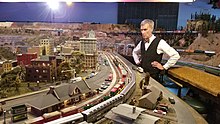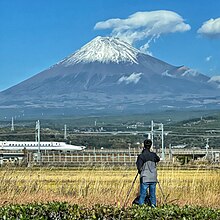
Railfan



A railfan, train fan, rail buff or train buff (American English), railway enthusiast, railway buff, trainspotter (Australian/British English) or ferroequinologist is a person who is recreationally interested in trains and rail transport systems.[1][2]

Railfans often combine their interest with other hobbies, especially photography and videography, radio scanning, railway modelling, studying railroad history and participating in railway station and rolling stock preservation efforts. There are many magazines and websites dedicated to railfanning and railway enthusiasts, including Trains, Railfan & Railroad, The Railway Magazine, Locomotive Magazine and Railway Gazette International.

Other names
In the United Kingdom, rail enthusiasts are often called trainspotters or anoraks. The term gricer has been used in the UK since at least 1969 and is said to have been current in 1938 amongst members of the Manchester Locomotive Society, according to the Oxford English Dictionary. There has been speculation that the term derives from "grouser", one who collects dead grouse after a shoot, but other etymologies have also been suggested.[3]

In Australia, they are sometimes referred to as "gunzels".[4][5]

In Japan rail enthusiasts are known as densha otaku, although numerous terms exist to describe activities falling within the category including Toritetsu for fans of photographing and/or filming trains, Nori-tetsu (people who enjoy travelling by train) and Eki-tetsu (enthusiasts of train station architecture).[6]

In the United States, they can be referred to pejoratively as "foamers".[7][8] There is a dispute over the origin of this term. Some cite the extensive use of styrofoam to create scenery and landscaping in model railroad building, while others trace its origins to the related term "Foamite" (which stands for "Far Out and Mentally Incompetent Train Enthusiast") or claim it refers to "the notion of foaming-at-the-mouth craziness".[9]

"Ferroequinologist" derives from the use of "Iron horse" as a nickname for early steam locomotives.

Activities


The hobby extends to all aspects of rail transport systems. Railfans may have one or more particular concentrations of interest, such as:

- Railway locomotives and rolling stock
- Still-used or disused railroad lines, bridges, tunnels, stations, signal boxes and other infrastructure
- Subways and other local rail transit systems
- Railway history
- Railway photography
- Railway books and magazines
- Railtours
- Railway signalling
- Playing train simulators
- Railway modelling, both physical and virtual model railroading, toy train collecting, live steam and outdoor miniature railways, and model engineering.
- Collection of railway artifacts, in particular: tickets, timetables, posters, railway paper, route maps, locomotive whistles, number plates, builder's plates, builder's photos, badges, uniforms, railway crockery and other railwayana. Many items, such as timetables and railway paper (i.e. internal railway documents), are collected for study and not just as collectibles.
- Railway art or architecture
- Railway operations, economics or commerce
- Railway advocacy and politics relating to railways (in some democratic countries)
- Railway preservation/restoration
- Level crossings and their infrastructure. This is where the railfan can also be interested in the railroad or "grade" crossing signals.
- Monitoring railroad radio communications with a radio scanner.
The scope of the subject is so large that fans may additionally concentrate their interest on a particular country, town, railway company, field of operations or era in history – or a combination of any of the above.

Railway photography


Train photography is a common activity of railfans. Most railfans do their photographing from public property, unless they have permission to use a specific private property owner's land. Occasionally, they run into problems with law enforcement, especially due to post 9/11 security concerns, because they are sometimes viewed as suspicious. In 2004, for example, the New York City Subway attempted to institute a photo ban, which was met with fierce opposition and ultimately scrapped.[10] In sharp contrast, the Port Authority Trans–Hudson (PATH) successfully implemented a photo ban that is still in effect (although it predated the 11 September attacks and the 1993 World Trade Center bombing); it has led to confiscations and arrests on the PATH system.[11]

- In the United Kingdom, photography is allowed at all stations on the National Rail network.[12] Transport for London, however, does not allow photography without permission and a permit issued by the TfL Film Office. However, photography for personal use, without ancillary equipment is allowed without a permit.[13] The Tyne & Wear Metro prohibits all photography without written permission from Nexus, the system's operators. As of 2015, it is the only system in the UK with such a policy.[14]
- In Singapore, private photography is allowed at any one time, except those on movie productions or wedding photoshoots, they may need approval from the public transport operators' offices.[15]
- Spanish railroad company Renfe used to ask for a permit, but since 2018 it is not needed.[16]
- In Greece, railway photography is permitted on all networks[17]
- In Russia, railway photography is permitted on all networks[18]
- In Italy, the Royal Decree n°1161 enacted on 11 July 1941, concerning "military secrets", prohibited all and any photographs and video recordings in and around a number of civilian and military installations, including public railways. Railway photography was largely tolerated by tacit agreement, but could be prosecuted as a felony. The law was repealed by Legislative Decree n°66 enacted on 15 March 2010.[19][20]
- In Germany, Deutsche Bahn allows non-commercial photography as long as no additional equipment such as tripods are used.[21]
- In Indonesia, Kereta Api Indonesia allows photography on a train station and inside the train as long is for private use, on a public area and without ancillary equipment such as tripod and drones. Such equipment must have additional permission from the station master or operating divisions' public relations.[22]
Trainspotting
A trainspotter may use a data book listing the locomotives or equipment in question, in which locomotives seen are ticked off. An early trainspotter was 14-year-old Fanny Gordon, who in 1861 recorded the names of locomotives passing Westbourne Park station on the Great Western Main Line.[23] The hobby is referenced in Edith Nesbit's 1905 children's book The Railway Children.[24] In Great Britain, this aspect of the hobby was given a major impetus by the publication from 1942 onward of the Ian Allan "ABC" series of booklets, whose publication began in response to public requests for information about the locomotives of the Southern Railway.[25]

Railway trips
Bashing
In general terms, bashing, a term used by British railway enthusiasts, describes a trip, excursion or holiday primarily involving train travel, usually with the intention of collecting mileage on a train or for covering unexplored parts of the rail network.[citation needed]

The practice of bashing dates back to the decline of steam locomotive operations, when more passionate trainspotters wished to note which steam engines they had travelled behind.[26] Following the withdrawal of mainline steam in 1968, a new generation of bashers took to accumulating mileage behind diesel locomotives; the variety of diesel types, destinations to travel behind them, and the pursuit of clearing classes all fuelled the popularity of bashing.[26][27] Today, despite the majority of British trains being formed of multiple units, bashing still remains a popular pastime for railway enthusiasts.

"Shed bashing" describes going out to as many railway sheds or depots as possible. It was very popular in the 1950s and 1960s. As they required a permit that could be hard to obtain, some "shed bashers" were illegal.[28]

Fantrips
Many railway preservation groups run special trips for railfans using restored trains, often on "rare mileage" lines that do not see regular passenger service.[29] These trips are both social events and opportunities for railfans to photograph unusual trains. Chasing a fantrip by road for the purposes of photography is often referred to as "motorcading" in Australia.[30][31]

Other activities
Some enthusiasts combine their interest in trains with the hobby of monitoring radio communications, specializing in listening to radio communications of railroad operations using a scanner.[32]

In some busy rail corridors, local governments have budgeted, constructed and maintain railfan viewing platforms, sometimes part of a park area or nearby rail museum, which they promote along with other tourist attractions.[33][34] One such example is the Folkston Railfan Platform along CSX tracks in Folkston, Georgia, USA, where viewers can see regular Florida freight traffic, as well as Amtrak passenger trains, including its daily AutoTrain.

In some democratic countries, such as Canada, many railfans advocate politically for expanded railway infrastructure and promote civic engagement that encourages further development of railways.[35]

Safety

Owing to their presence at stations and near other areas of rail infrastructure, railfans have sometimes been requested to aid railways and legal authorities alike in observing and reporting safety breaches and incidents of crime. Railfans in the United States have been asked by BNSF to keep railroad areas safer by reporting crimes and suspicious activity.[36]

In the United Kingdom the British Transport Police have asked trainspotters to report any unusual behaviour and activities at stations.[37]

In the United States, concerns about terrorism have led to situations where railfans are followed or confronted by local law enforcement or transit police.[38][39] This has also led to situations where certain transportation agencies have implemented photography bans systemwide.

A railfan was a factor in the 2008 Chatsworth train collision, as the engineer responsible for the accident had been distracted by texting the railfan while in charge of his train, eventually causing it to pass a signal at danger and crash into an oncoming Union Pacific freight train, killing 25 and injuring 135 others.[40]

BNSF instituted the "Citizens for Rail Security"[41] (CRS) program for the general public to report suspicious activities on their railways. Obtaining this card was common for railfans and is a derivative of the BNSF "On Guard" program for employees. However, this card does not recognize members as employees or contractors, asks them to keep off railway property, and is no longer obtainable. Amtrak offers a similar program, "Partners for Amtrak Safety and Security" (PASS).[42]

In Japan, toritetsu have been frequently criticised for their behaviour when photographing trains, including incidents of vandalism and trespassing into restricted areas to set up cameras, destruction of lineside property and plants to clear a view of the track, stealing goods to sell on to fund expensive cameras,[43] theft of railway equipment, being rude towards station staff and train drivers,[44] physical assault,[45] and attempting to intimidate passengers and road users for inadvertently interfering with their activities.[46]

Network Rail, the British rail infrastructure owner and station operator, has produced guidelines for the behaviour and responsibilities of railway enthusiasts at its stations.[47] In May 2010, the dangers of acting carelessly in the vicinity of an active railway were highlighted after an enthusiast, standing immediately next to a double track line photographing the Oliver Cromwell, failed to notice a Bombardier Turbostar express train approaching at ~70 mph (112 km/h) on the nearer track in the other direction, and came within inches of being struck by it.[48][49]

See also
- Anorak (slang)
- List of railroad-related periodicals
- Rail terminology
- Rail transport modelling
- Railway enthusiasts societies in the United Kingdom
- RR (2007 railfan film by James Benning)
- Sensible Train Spotting, the world's first computer train spotting simulator
- The Station Agent, 2003 film starring Peter Dinklage as a railfan who inherits a train station.
- Train whistle
- Trainspotters in the United Kingdom
- Tracks Ahead
Similar hobbies
- Aircraft spotting
- Bus spotting
- Car spotting
- Ship watching
- Gongoozlers, enthusiasts of canals in the United Kingdom
- Roadgeek
- Fire buffs, enthusiasts of firefighting and emergency services
Glossaries
- Glossary of North American railway terms
- Glossary of Australian railway terms
- Glossary of United Kingdom railway terms
- Glossary of New Zealand railway terms
References
- ^ Larson, Russ (1974). "Learn the lingo". N Scale Primer (Fourth printing, 1977 ed.). Milwaukee, WI: Kalmbach Publishing. p. 101.
- ^ Kisor, p. 5.
- ^ "Gricer, n.". Oxford English Dictionary. Retrieved 5 March 2015.
- ^ Campbell, Don (2 January 2004). "Gunzels". Trams Down Under. Tramway Museum Society of Victoria. Archived from the original on 5 September 2007. Retrieved 5 October 2007.
- ^ Moynihan, Stephen (1 October 2007). "Rail Fans Celebrate Own Win as New Line Launched". The Age. Archived from the original on 13 October 2007. Retrieved 5 October 2007.
- ^ "Trainspotting in Japan". JRPass.com. Archived from the original on 28 June 2022. Retrieved 30 June 2022.
- ^ Gold, Scott (12 May 2007). "Train hobbyists are loco for that motion". Los Angeles Times. Archived from the original on 14 October 2021. Retrieved 19 June 2022.
- ^ McGrath, Ben (29 August 2022). "All Aboard the Berkshire Flyer!". The New Yorker. Vol. 98, no. 27. Condé Nast (published 5 September 2022). p. 14. ISSN 0028-792X. Archived from the original on 10 September 2022. Retrieved 10 September 2022.
- ^ Barry, Dan (7 November 2009). "Awesome Train Set, Mr. Buffett". New York Times. ISSN 0362-4331. Archived from the original on 5 August 2017. Retrieved 2 January 2022.
- ^ "village voice > nyclife > Forbidden Photos, Anyone? by Matt Haber". 28 February 2005. Archived from the original on 28 February 2005. Retrieved 18 March 2016.
- ^ "Is it really illegal to take pictures in the train station? Transit agencies have differing policies for photographers videographers a". Hudson Reporter. 23 December 2014. Archived from the original on 13 April 2022. Retrieved 2 March 2018.
- ^ "Railway enthusiasts". Network Rail. Archived from the original on 30 December 2016. Retrieved 25 September 2015.
- ^ "Filming & photography on TFL". Archived from the original on 6 April 2022. Retrieved 16 May 2018.
- ^ "Photography and filming | nexus.org.uk". Nexus. Archived from the original on 12 November 2019.
- ^ "SMRT Trains: FAQs". SMRT Trains. Archived from the original on 16 July 2022. Retrieved 26 April 2019.
- ^ "Adif - Permisos de aficionados". adif.es (in Spanish). Archived from the original on 24 August 2021. Retrieved 11 July 2017.
- ^ "Legal case" (PDF). Archived from the original (PDF) on 14 March 2016. Retrieved 21 April 2016.
- ^ "распоряжение 1513р". Archived from the original on 24 February 2021. Retrieved 17 November 2018.
- ^ "Regio Decreto 11 luglio 1941, n. 1161. - Norme relative al segreto militare" (PDF). www.meniero.it/. 12 April 2013. Archived (PDF) from the original on 7 March 2021. Retrieved 4 December 2013.
- ^ "Decreto Legislativo 15 marzo 2010, n. 66" (PDF). www.difesa.it/. Archived (PDF) from the original on 26 December 2021. Retrieved 31 August 2015.
- ^ "Informationen für Hobbyfotografen und –filmer" (PDF). Archived (PDF) from the original on 24 June 2021. Retrieved 6 July 2022.
- ^ Aira, Tidar (8 October 2022). "Foto-foto di Stasiun Kereta Api Harus Izin? Ini Penjelasan PT KAI" (in Indonesian). Depok Today. Retrieved 6 August 2023.
- ^ Foster, Mark (27 August 2014). "First recorded trainspotter was not man clad in anorak but 14-year-old girl Fanny Johnson". Northern Echo. Archived from the original on 26 November 2021. Retrieved 1 August 2021.
- ^ Nesbit, E. 1905. The Railway Children. London: Wells, Gardner, Darton. Ch. 3
- ^ Interview with Ian Allan as part of the Last Days of Steam broadcast as part of the Timeshift series, BBC Four, 5 April 2012
- ^ a b Chard, Andy (2023). Winners & Losers: Loco Bashing Tales from the 1990s. Platform 5. p. 8.
- ^ Carter, Gary. "Everything You Need To Know About "Bashing"". (A Beginner's Guide). Dreadful.org.uk. Archived from the original on 18 July 2007. Retrieved 27 March 2007.
- ^ Railway Top Spots: Revisiting the Top Train Spotting Destinations of Our Childhood - by Julian Holland
- ^ "Rare Mileage". American Heritage. Archived from the original on 1 December 2008. Retrieved 29 October 2007.
- ^ "Australian Railway Slang". Home.alphalink.com.au. Retrieved 15 March 2012.
- ^ "Hotham Valley Railway". Hotham Valley Railway. Archived from the original on 5 March 2022. Retrieved 15 March 2012.
- ^ Tom Kneitel, K2AES (1990) [1982]. Rail-Scan: Directory of railroad scanner frequencies. New York: CRB Research Books, Inc. pp. 5–6. ISBN 0-939780-12-7.
{{cite book}}: CS1 maint: numeric names: authors list (link) - ^ "New railfan tower opens near Cincinnati". Trains. 7 November 2018. Retrieved 2 November 2023.
- ^ "Cordele, Ga., opens viewing platform for busy, three-railroad diamond". Trains. Retrieved 2 November 2023.
- ^ "Advocacy and Lobbying". Rail Fans Canada. Retrieved 18 October 2024.
- ^ "BNSF Railway Asks Rail Fans for Cooperation To Keep America's Rail System Safe". BNSF. 7 June 2006. Archived from the original on 8 February 2008. Retrieved 4 February 2008.
- ^ "British Transport Police advice to Rail Enthusiasts". British Transport Police. Archived from the original on 9 June 2017. Retrieved 13 August 2014.
- ^ Ripley, Amanda (16 May 2004). "Hobbyist or Terrorist?". Time. Archived from the original on 4 August 2021. Retrieved 11 July 2015.
- ^ Phillips, Don (17 November 2002). "'Railfans' Love Trains, But They Draw Stares From Cops After 9-11". orlandosentinel.com. Archived from the original on 11 July 2015. Retrieved 11 July 2015.
- ^ "Dead Metrolink engineer let railfans sit at controls". Trainorders.com Discussion. Archived from the original on 12 November 2022. Retrieved 12 November 2022.
- ^ "Citizens for Rail Security has moved". Archived from the original on 10 July 2018. Retrieved 18 March 2015.
- ^ "Partners for Amtrak Safety and Security website". police.amtrak.com. Archived from the original on 10 July 2022. Retrieved 25 September 2014.
- ^ "Tokyo Police arrest 24-year-old suspect dubbed the 'Lego Kid' for stealing toys". NextShark. 30 June 2022. Archived from the original on 3 November 2022. Retrieved 1 July 2022.
- ^ "Train enthusiasts gone wild! Are Japan's train photographers losing their social graces?". SoraNews24 -Japan News-. 3 January 2014. Archived from the original on 7 September 2022. Retrieved 1 July 2022.
- ^ Auto, Hermes (28 March 2022). "Japan's hardcore train fans accused of going off the rails | The Straits Times". www.straitstimes.com. Archived from the original on 5 July 2022. Retrieved 1 July 2022.
- ^ "Furious train otaku in Japan confront foreign bicyclist after he gets in the way of their cameras". SoraNews24 -Japan News-. 6 August 2021. Archived from the original on 11 August 2022. Retrieved 1 July 2022.
- ^ "Railway enthusiasts". Network Rail. Archived from the original on 30 December 2016. Retrieved 15 March 2012.
- ^ "Train spotter in narrow escape". BBC News. 14 May 2010. Archived from the original on 12 March 2012. Retrieved 14 May 2010.
- ^ "Railway buff filming in Suffolk fails to see express". BBC News. 14 May 2010. Archived from the original on 6 May 2022. Retrieved 14 May 2010.
Sources
- Kisor, Henry (1994). Zephyr: Tracking a Dream Across America. Holbrook, Massachusetts: Adams Publishing Group. ISBN 1-55850-477-X.
- Heritage Railway. No. 122. March–April 2009.
{{cite magazine}}: Missing or empty|title=(help)[pages needed]
Further reading
- Adams, Will (2006). Trainspotting Days. Kettering: Silver Link Publishing. ISBN 1-85794-267-1.
- Carter, Ian (2008). British Railway Enthusiasm. Manchester: Manchester University Press. ISBN 978-0-7190-6566-8.
- Gray, Adrian (February 1986). "Rail Enthusiast No. 1". Rail Enthusiast. No. 53. Emap. p. 43. ISSN 0262-561X. OCLC 49957965.
- Harvey, Michael G. (2004). Forget the Anorak: what trainspotting was really like. Stroud: Sutton Publishing. ISBN 0-7509-3402-6.
- Harvie, Christopher (1992). "The English railway enthusiast". In Diller, Hans-Jürgen (ed.). Englishness. Heidelberg: Carl Winter. pp. 107–22. ISBN 3-533-04536-6.
- Marchant, Ian (2003). Parallel lines: or, Journeys on the Railway of Dreams. London: Bloomsbury Publishing. ISBN 0-7475-6578-3.
- Marsden, Colin J. (2010). Rail Guide 2010. Shepperton: Ian Allan Publishing. ISBN 978-0-7110-3457-0.
- Mathison, Phil (2006). Shed Bashing with the Beatles. Newport, Yorkshire: Dead Good Publications. ISBN 0-9546937-3-6.
- Packer, David (2003). Well Trained. Leigh: Triangle Publishing. ISBN 0-9529333-8-1.
- Whittaker, Nicholas (1995). Platform Souls: The Trainspotter as Twentieth Century Hero. London: Gollancz. ISBN 0-575-05981-8.
External links
See what we do next...
OR
By submitting your email or phone number, you're giving mschf permission to send you email and/or recurring marketing texts. Data rates may apply. Text stop to cancel, help for help.
Success: You're subscribed now !
